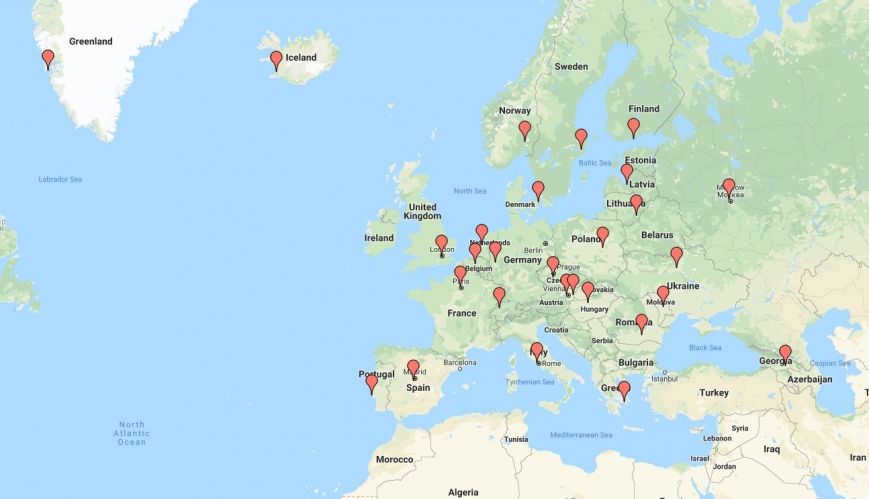Army in Europe launches united assault on human trafficking

Army in Europe launches united assault on human trafficking
The Salvation Army across Europe has united to help combat and raise awareness of human trafficking as part of a three-year campaign.
The Salvation Army has commenced its first European pan-continental campaign to raise awareness of – and deter people from being lured into – human trafficking and modern slavery.
Around half of the 31 European countries with a Salvation Army presence have begun a multi-modal campaign, encouraging consumers to consider whether low prices come at the high cost of human exploitation.
In ‘source’ countries, social media activity and poster campaigns are prompting job hunters, who may be susceptible to unrealistic offers of work abroad, to consider whether the offers are too good to be true.
The campaign will gradually build across Europe. Each country will start at its own level and expected launch date. By the end of 2019, we envision that all 23 countries would have joined the three-year campaign.
Coronation Street drama series
The Salvation Army in the United Kingdom is the latest to launch its variation of the campaign, coinciding with a major modern slavery plotline in the popular national ITV drama series, Coronation Street.
Script editors have been working behind the scenes with Salvation Army specialists who provide support to victims who have been rescued from slavery in the UK. In what is set to be an ‘explosive’ series of events for the character Alina Pop, the devastating truth about her life as a trafficked woman is revealed.
Romanian actor Ruxandra Porojnicu, who plays Alina, has spoken about the importance of raising awareness of these important issues. She said: “All these victims, like in Alina’s case, can appear like they are living a normal life. No one would notice they are going through such tough times and they need help unless we look more closely. Victims need to know there are so many people who care for them and support is available when they need it.
 Information booklets on human trafficking are available in various languages.
Information booklets on human trafficking are available in various languages.
“I am keen to raise awareness about this worldwide problem and not be indifferent. We should all know about modern slavery. We should all spread awareness about subjects that have such a negative impact on people’s lives so that changes can be made and help provided. Some people are depending on us and our actions.”
‘Fake’ advertising
From the fictional Weatherfield in the north-west of England, to the red-light district of Amsterdam, from affluent Oslo in Norway to the poorest European capital city, Chisinau in Moldova, The Salvation Army is working to prevent victims entering the cycle of modern slavery and is supporting victims where they have escaped from the grips of their slave masters.
The Salvation Army’s pan-European anti-trafficking campaign uses ‘fake’ adverts to show that human tragedy often lurks behind cheap products and services, and the demand for a deal fuels trade in men and women who are forced to work for little or no money and live in sub-standard conditions, deprived of their freedom.
The adverts trick people into thinking they are going to get a cheap deal on goods commonly funded by modern slavery, such as nail bars and car washes. Once the audience clicks through to the advert the truth is revealed, as they are taken to a landing page – in their own language – featuring stories of real victims of modern slavery who have been supported by The Salvation Army and information on how to be more mindful of the risks.
The campaign concept has been created by the Swedish Agency House of Friends. “In a unique and powerful way the campaign is strongly focused on increasing the awareness and stopping the demand for modern slavery and the recruitment of victims,” says Lars Beijer, a representative from The Salvation Army European Communication Network.
“We need to stop using these services and take responsibility for what we use,” adds Madeleine Sundell, an anti-trafficking lawyer for The Salvation Army in Sweden, one of the countries that have spearheaded and part-financed the campaign.
Cultural context
This is the first time that Salvation Army anti-trafficking practitioners have joined forces with their communications colleagues on a Europe-wide basis.
The precise implementation of the campaign varies from country to country, to remain sensitive to the local needs and context. Examples of the way the campaign is being used can be seen at highcost.salvationarmy.org
 Victims of human trafficking are found across Europe and the world.
Victims of human trafficking are found across Europe and the world.
In the Latvian capital Riga, thanks to support from [global outside advertising corporation] JCDecaux, a large number of posters have been installed on bus stops, ensuring that anyone using the public transport network is confronted with the messaging.
Meanwhile, in Finland, members, employees and supporters of The Salvation Army have been provided with resources to help them identify the sometimes-subtle signs of trafficking, ahead of a two-week public roll-out in September. The campaign will run for three years, with planning for 2020 already underway.
Salvationists and friends in all 131 countries in which The Salvation Army operates are invited to take part in the International Day of Prayer for Victims of Human Trafficking. This year the event takes place on Sunday 22 September. Information and resources are available here.
Modern-day slavery is one of the biggest social injustices of our time. It’s a humanitarian catastrophe, a serious crime and a gross violation of human rights with devastating consequences – the cost of human freedom. It does not belong to our time.
We have to fight it, and we need an Army to do it.
Spot the signs
You could come into contact with a victim of modern slavery without even realising; however, there can be some telling signs.
 People are trafficked into many different industries.
People are trafficked into many different industries.
Some signs are physical:
- They may look uneasy, unkempt or malnourished.
- They may have untreated injuries.
Some signs are less obvious:
- Someone else is paying for their travel.
- Someone else is speaking for them.
- Perhaps they are picked up and dropped off from work at unusual times.
- They may not be sure of their own address.
When you change the way you look at things, the things you look at change.
In Australia, if you come into contact with someone you think may be a victim of human trafficking or slavery, contact the Australian Federal Police.
You can use the online form to report information regarding human trafficking for the purposes of sexual and/or labour exploitation, organ harvesting, forced marriage and slavery. Alternatively, call 131 AFP (131237) or email AOCC-Client-Liaison@afp.gov.au
Comments
No comments yet - be the first.